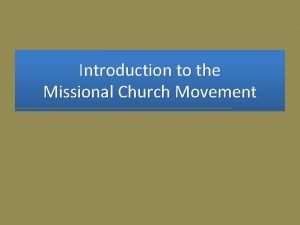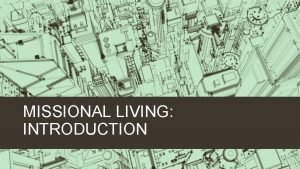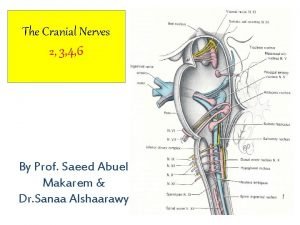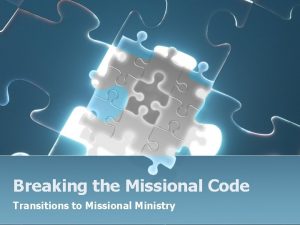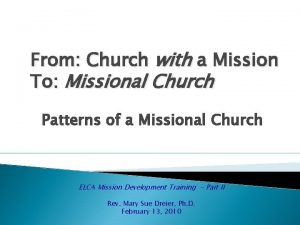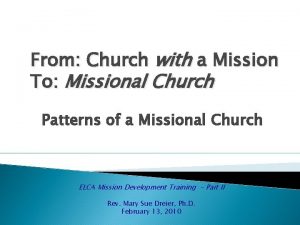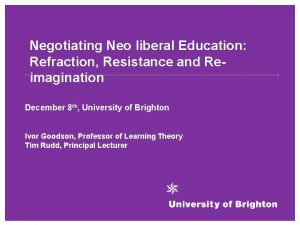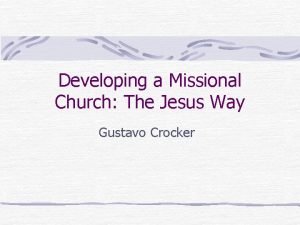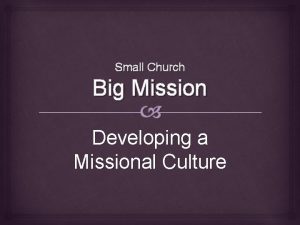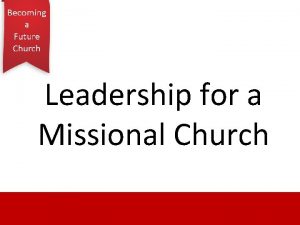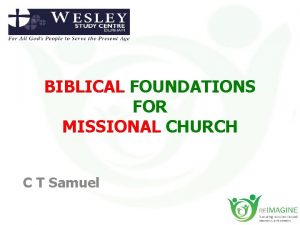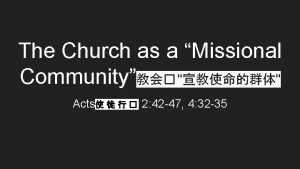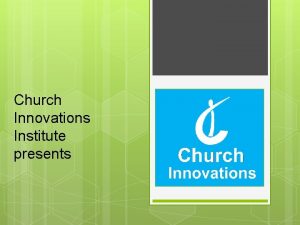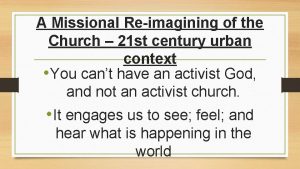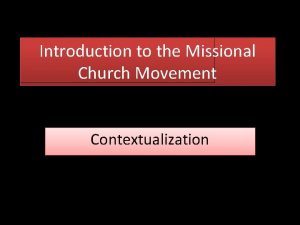A Missional Reimagination of the Church Order Prof

































- Slides: 33

A Missional Reimagination of the Church Order Prof. Nelus Niemandt

Complexity and Accelerations § Nelus Niemandt

Complexity and Accelerations § § § Rapid acceleration in globalisation – where the flow of information and knowledge leads to a hyper-connected world; Acceleration in climate change leads to biodiversity loss and the restructuring of nature; Acceleration in computing power and mart technology to seamless complexity. (Thomas Friedman)

Complexity and Accelerations § § § Transforming every single aspect of modern life. This is a time where institutions that survived for ages are under pressure and where even resilient institutions such as churches face unprecedented challenges. It is not only a question of an increase in the rate of change, but an issue of dislocation because the rate of change exceeds the ability of mankind to adapt to change.


Complexity and Accelerations § § Societal structures are failing to keep pace with the rate of change, and the world is starting to operate differently. Challenges all organisations (including churches) § Structures § Leadership § Praxis

Why bother about cultural change? History is primarily understood as a chief form of the culture of the continuing struggle of the church to be what it is and to become what it should be in the economy of God. Just so, it follows as a matter of coherence that cultural analysis has pride of place for the contemporary theologian who seeks to understand God truly, indeed, who strives to seek out God’s preferred and promised future. Patrick Keifert (2017, Cultivating Missional Change)

Gatekeepers and traders

Gatekeepers and traders § Big systems, such as denominations, have “traders” and “gatekeepers” that determine the flow of ideas, the pace of transformation and orientation on the identity of systems. The life and actions of a complex system such as denominations are influenced by the relationship between traders and gatekeepers.

Gatekeepers § § § Gatekeepers are the guardians of the status quo. They must ensure stability, fidelity and control. Their mission is to slow the pace of change and to bring stability to the system by leaning back into the past: § § § the aim to build on the best in the history of the system, to preserve that of the past worthy of taking into the future. It is to drive forward but keeping an eye on the rear view-mirror.

Traders § § Traders are at the forefront of change. They are the “innovators” and “early adopters” in the system. Traders ring in changes and introduce new grammar, ideas, and innovation. Traders try to direct accelerations and to incorporate a culture that embraces change: § Friedman: the most resilient countries and systems are those that are able to absorb many alien influences and incorporate them into the system while maintaining overall stability.

Missional church & traders Nelus Niemandt

Missional church & Traders § § Teams that are tasked with the interpretation and application of the church order of a denomination will attract more gatekeepers than traders, and such teams are naturally inclined to see their role as custodians of the tradition and identity, rather than agents of change. This opens the way for using the church order to control the flow of transformation and change in the system. All complex systems end up with walls and gates, as well as gatekeepers and traders, in an intricate movement to manage the flow between ‘this side’ and ‘that side’.

Missional church & Traders § § Missionaries are typical traders. They are focused on finding creative solutions and prone to be caught up in a mission to expend their talents for a self-transcending cause – they are people convinced that God has entrusted creation to human beings not merely as caretakers of a past condition but as co-creators with a God of the future. (Haight 2014: 55). No wonder many a missionary tale will relate how the missionary scaled walls, travelled by secret routes and smuggled Bibles and missionary messages to those on the ‘other side’. Missionaries reach out to the ‘other’, welcome strangers, find their way through walls and gates and eat what is put before them. And yes, just sometimes, they break down the walls.

Missional church & Traders § § § Roxburgh (2008, 96) argues that denominations face critical choices – to either remain inside the city gates (gatekeepers) or to risk the liminal experiences that lie outside the walls (traders). To risk it outside the gates involves the grammar of an organizational self-understanding centered on the participation in God’s mission - a missional grammar. Missional church is to be OPEN towards God and other people. The wish to be faithfully present is part and parcel of being a missional church. To be truly incarnational, we have to cross boundaries, break down social constructionist symbolic fences and barriers, build bridges that create the possibility of open communication and interaction.

Missional church & Church Order (polity) Nelus Niemandt

In a missional paradigm… § § § … the Church Order facilitates participation in the mission Dei. … the Church Order allows contextualization and the church to be faithfully present: § allow the church to adapt to disruptive complexity and accelerations. … the Church Order facilitates missional existence.

In a missional paradigm… § § …the Church Order is open and provisional: § “Churches change because God has a preferred and promised future for them. ” (Patrick Keifert, 2017, Cultivating Missional Change). … the Church Order is permission giving. … the Church Order determines borders but also creates space. … the Church Order allows risks and experiments: § “Churches that engage in the intentional Christian innovation cross a liminal threshold into God’s preferred and promised future. Such Christian innovation accepts these dynamics of failure, even death, and risks in seeking in Word and deed to make a spiritual journey. ” (Patrick Keifert, 2017, Cultivating Missional Change).

In a missional paradigm… § § The Church Order must assist the church to embody the leadership of Christ in a synodical-presbyterial system. On the missional journey, the church finds itself in ambiguity and unknown territory. We need a Church Order that facilitates this kind of ambiguity and the journey in God’s future.

Ideas on the structure of a missional CO Nelus Niemandt

Church Orders are important § § The church order is not a sterile document, but determines power and power relations in the DRC. Texts, especially institutionalized texts or discourses such as church orders, constitute church practice. We do things through words. Words are a form of action (Fairclough 1992, 71). Not only are texts produced and consumed but also distributed in specific genres and in particular contexts which all have an influence on the way meaning is constructed and participants positioned in certain roles (Fairclough 1992, 126).

Missional Church Order § § § Trinitarian basis: § I believe that the doctrine of the Trinity is ultimately a practical doctrine, which should inform not only our belief systems but also our lives and the ways in which we try to embody our faith. (Coenie Burger 2017). Missional nature, allowing God’s preferred future to beak into the present. Focus on the discipleship of all of God’s children and the office of all faithful people (“amp van gelowige”). Recognises Apostolate (Apostolaat) Relates to the foundational confessions of faith (identity).

Missional Church Order § § § Allows missional praxis. Allows the transformation, not only of church structures, but of habits and practices. Recognises the importance of worship: § “…the very nature of what it means to be human is as a creature being made for desire, love and worship of God - it’s to bring back every moment of the ordinary to the sacred. ” (Patrick Keifert 2017). § “Missional formation is liturgical. The gathered community comes together to glorify God through liturgies of worship. Participation in these liturgical practices over time forms appropriate and particular Christian desires in the mind, heart and will of the disciples. ” (Frederick Marais 2017).

Missional Church Order § Cultivates discernment and a safe space and structural opportunities for discernment: § Discernment flows from spirituality and nurtures wisdom – it is about making wise choices. § It is one of the most important qualities of leadership and emphasises wisdom and an awareness of that which is deemed ultimately important, and thus God’s presence in all of reality. § Discernment is about entering into the trialogue: the discerning interaction between church, culture and biblical narrative – to seek, discover, understand share in what the Holy Spirit is up to in the close-to-theground particulars of the church’s engagement in, with, against and for the world. § Discernment is the first, and most decisive, step on this missional journey.

Missional Church Order § Cultivates discernment and a safe space and structural opportunities for discernment: § “… moments of discernment are liminal moments, moments of passage from one way of being in the world to another. ” (Keifert, 2017) § Meylahn (2012: 38) says that the church is no longer an institution – created and sustained by the proclamation of a truth, and the correct administration of the sacraments – but a hermeneutical space of listening and discerning. § Discernment connects leadership, communal life and missional spirituality, especially in the safe space of worship and liturgy.

Spiritual discernment Deep in the mystery of spiritual discernment, is the rediscovery of the need for God’s mercy and the seeking of reconciliation with God, with one another in the gathered assembly, and with the many publics that make up the life world of the church. Patrick Keifert

Hope for a missional Dutch Reformed Church? Nelus Niemandt

Spectacular failures… or not? § § Confession of Belhar § 2/3 of 2/3 § Congregational and synodical level § Possible of eternally impossible? Gay/gender issues § Opening up § Reaction § New ways to be found? § At least “listening” and “discernment”, discourses on hermeneutics and identity of church.

Opening the way for a missional life in the Trinity § The executive of the DRC decided, at the very first meeting of their term, to prioritize the continued missional transformation of the DRC as its most important strategic goal (NG Kerk 2015 b, 14). It also decided to prioritize a revision of the church order of the DRC, in order to align the church order with the policy decisions made by the General Synod (NG Kerk 2015 a, 240). The chairperson of the executive, Nelis Janse van Rensburg, promised a new “missional church order” in an opinion piece in the official mouthpiece of the DRC (Janse van Rensburg 2016).

Opening the way for a missional life in the Trinity The interim order states the following on the missional identity of the proposed new united church: We as the four churches have decided to journey together, called by the Triune God to participate in His mission to the world, so that the world may believe that God has sent Jesus as Savior to the world. We therefore, envisage a new reunited church in the DRC Family, which is missional, committed to the Biblical demands of love, reconciliation, justice and peace (NG Kerk 2015 a, 240).

Opening the way for a missional life in the Trinity The balance between gatekeepers and traders is in the crucible of massive contextual changes and is being stirred by powerful convictions on the nature and identity of the DRC. The existing power relations, formed by the intrinsic relationship between language (especially formalised and institutionalised language) and power, and guarded by the custodians of formalised church language (actuarrii), is under pressure and does not facilitate the expansive and transforming nature of a missional ecclesiology. The DRC must make identitydefining choices that do not allow the current understanding of the church order to control the church and keep it in the mode of “business as usual”.

Opening the way for a missional life in the Trinity My conclusion is that the development of a theological and ecclesiological framework on the missional identity of the church (perhaps in the form of a new confession of faith), as well as the re-imagining of church polity and the eventual design of an appropriate and legitimising church polity, is of the utmost importance. This missional polity seeks to legitimise and organise church life in the best way possible to reflect its theological foundations and missional future.

Thank You Nelus Niemandt
 Missional church movement
Missional church movement Missional calling
Missional calling 1st order 2nd order 3rd order neurons
1st order 2nd order 3rd order neurons Hình ảnh bộ gõ cơ thể búng tay
Hình ảnh bộ gõ cơ thể búng tay Ng-html
Ng-html Bổ thể
Bổ thể Tỉ lệ cơ thể trẻ em
Tỉ lệ cơ thể trẻ em Voi kéo gỗ như thế nào
Voi kéo gỗ như thế nào Tư thế worm breton là gì
Tư thế worm breton là gì Alleluia hat len nguoi oi
Alleluia hat len nguoi oi Môn thể thao bắt đầu bằng từ đua
Môn thể thao bắt đầu bằng từ đua Thế nào là hệ số cao nhất
Thế nào là hệ số cao nhất Các châu lục và đại dương trên thế giới
Các châu lục và đại dương trên thế giới Công thức tính độ biến thiên đông lượng
Công thức tính độ biến thiên đông lượng Trời xanh đây là của chúng ta thể thơ
Trời xanh đây là của chúng ta thể thơ Cách giải mật thư tọa độ
Cách giải mật thư tọa độ Phép trừ bù
Phép trừ bù Phản ứng thế ankan
Phản ứng thế ankan Các châu lục và đại dương trên thế giới
Các châu lục và đại dương trên thế giới Thơ thất ngôn tứ tuyệt đường luật
Thơ thất ngôn tứ tuyệt đường luật Quá trình desamine hóa có thể tạo ra
Quá trình desamine hóa có thể tạo ra Một số thể thơ truyền thống
Một số thể thơ truyền thống Cái miệng nó xinh thế
Cái miệng nó xinh thế Vẽ hình chiếu vuông góc của vật thể sau
Vẽ hình chiếu vuông góc của vật thể sau Nguyên nhân của sự mỏi cơ sinh 8
Nguyên nhân của sự mỏi cơ sinh 8 đặc điểm cơ thể của người tối cổ
đặc điểm cơ thể của người tối cổ Ví dụ giọng cùng tên
Ví dụ giọng cùng tên Vẽ hình chiếu đứng bằng cạnh của vật thể
Vẽ hình chiếu đứng bằng cạnh của vật thể Fecboak
Fecboak Thẻ vin
Thẻ vin đại từ thay thế
đại từ thay thế điện thế nghỉ
điện thế nghỉ Tư thế ngồi viết
Tư thế ngồi viết Diễn thế sinh thái là
Diễn thế sinh thái là
